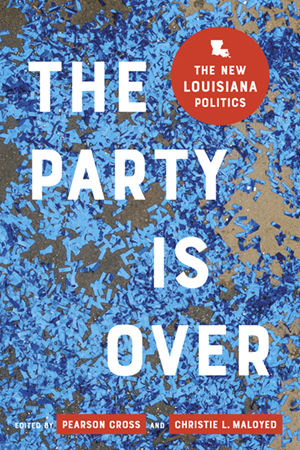
256 pages / 6.00 x 9.00 inches / 18 tables; 17 graphs; 1 map
History / United States - Southern History | Political Science / American Government | Political Science / Public Policy - General
For decades, the Louisiana political scene has been a source of interest and intrigue for scholars and casual observers alike. In recent years, the state’s political, economic, and environmental challenges have drawn sustained attention from regional and national media. Observers have typically focused on Louisiana’s distinctive political culture, including jungle primaries, colorful candidates, and tolerance for scandal. However, recent shifts have eroded the state’s unique political character, aligning it with national political trends of partisan realignment, political polarization, and outside influence in state and local elections.
The Party Is Over brings together top scholars, journalists, and policy analysts to investigate these recent shifts in institutions, politics, and policy and situate them in the context of national politics. Both accessible and thorough, the volume offers an informed and reliable foundation for those new to Louisiana’s political culture and for long-time observers seeking new insights into recent developments. Contributors recognize the challenges posed by the new politics and point toward opportunities to leverage the state’s cultural and economic strengths to build a better Louisiana.
Pearson Cross is director of the School of Behavioral and Social Sciences at the University of Louisiana at Monroe.
Christie L. Maloyed is associate dean of liberal arts and associate professor of political science at the University of Louisiana at Lafayette.
“Louisiana politics has indeed transformed, and this is the book that captures it. Pearson Cross and Christie Maloyed assembled an all-star group of analysts who clearly explain the changing nature of our state’s governing institutions, political behavior, and key policy areas. This is a book on Louisiana politics that we not only needed but are very lucky to have. The book presents clear descriptions of the reasons for decline of several hallmarks of Louisiana uniqueness. Conventional wisdom about Louisiana’s institutions, such as the power of the governor and the localism of the legislature, are confronted and examined in the first section. In the second part, the authors describe how and why Louisiana has become both more southern and more nationalized in its public opinion and electoral politics. In the final section of this superb book, Louisiana economic, coastal, poverty, crime, and race policy get the attention they deserve. It’s all here. It’s expertly done. It’s well worth the read.”—Wayne Parent, Russell B. Long Professor of Political Science at Louisiana State University and author of Inside the Carnival: Unmasking Louisiana Politics
“This is an impressive collection of essays, written by individuals deeply knowledgeable about Louisiana politics and policy. Existing work on Louisiana politics often focuses on the storytelling, reflecting Louisiana’s colorful past and eccentric cast of characters. While this makes for an entertaining read, it misses broader and more telling patterns, and it fails to make connections across states and to national trends. This book nicely maintains the narrative structures that make for an interesting read while connecting to these broader patterns. It is a book that is well written and easy to read but that doesn’t sacrifice depth. This type of examination is much needed and long overdue.”—Kirby Goidel, professor in the Department of Communication and the Public Policy Research Institute at Texas A&M University and author of America’s Failing Experiment: How We the People Have Become the Problem
“The Party Is Over is an excellent introduction to the contemporary political culture of Louisiana. The chapters are short, but often cover a lot of ground. . . . It would work particularly well in introductory classes on the political culture of Louisiana or state politics in the South. The essays lay the groundwork for further investigations into the emergence of the new Louisiana politics.”—Journal of Southern History
Found an Error? Tell us about it.